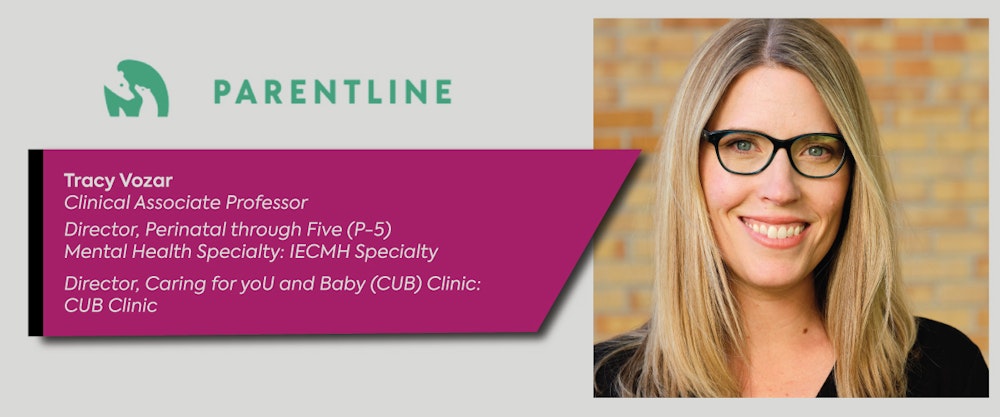
CONNECTING MOMS AND FAMILIES WITH MENTAL HEALTH CARE BY BREAKING DOWN BARRIERS AND MAKING EVERYTHING MORE ACCESSIBLE.
Parentline Colorado
Tracy Vozar
Clinical Associate Professor
Director, Perinatal through Five (P-5) Mental Health Specialty: IECMH Specialty
Director, Caring for yoU and Baby (CUB) Clinic: CUB Clinic
University of Denver’s Graduate School of Professional Psychology (GSPP) is transforming the way we think about and approach mental health and wellness. They are dedicated to offering groundbreaking academic programs and experiential training that aims to help providers better meet the needs of the communities they serve.
GSPP's new telehealth resource for families is called Parentline Colorado and it is helping to build the telehealth field in Colorado. Dr. Tracy Vozar, Director of the Perinatal through Five Mental Health Specialty and Clinical Associate Professor, joined GSPP four years ago and was especially interested in creating training programs for perinatal through five psychologists in very concentrated areas of the state.
“I had previously lived in Louisiana and Illinois and, like Colorado, they have pockets of lots of great mental health professionals, and then lots of the state where there's no one,” Tracy recalled. “Before COVID we were interested to use Zoom to reach these people, but there was really a lot of stigma around the idea of using telehealth for mental health care.”
Tracy said that at first, she was skeptical about telehealth care in perinatal, infant and early childhood mental health because the care is so relational. But at a national conference, she trained with her colleague, Dr. Dhara Meghani, who is a clinician and a professor in California and the founder of the telehealth platform, Parentline.
Tracy realized that perinatal through five is an awesome population for telehealth because so often they're experiencing issues that make it difficult to leave home such as bed rest, other health concerns or concerns and stresses about their newborns. “It’s hard to get out of the house as a mom, dad or caregiver with young children, and that makes it especially hard for them to come to a traditional clinical model of a one-to-one session where you would also need childcare and transportation to get to the clinic.”
From taking time off of work to having the right insurance to finding childcare, Tracy said that there are so many barriers for moms to access mental health care. And in Colorado, there is also the access issue of geographic barriers in rural communities with no in-person care nearby.
So, she received permission and training from Dhara to launch the second offering of Parentline. They received funding from Constellation Philanthropy to pilot the program and now have additional funders so they are able to offer service free of charge.
“We were just two months into offering these new telehealth services before COVID shut everything down,” Tracy said. “And literally overnight everything changed to telehealth.”
Tracy explained that while Telehealth like Parentline breaks down so many barriers, one of the big barriers that are still an issue is access to consistent internet or cell phone coverage. “We’ve had to help think through connecting with clients like helping them find a public library nearby that has a good Internet connection,” she said. This program is also helping to reach a larger audience by offering Parentline in both Spanish and English, with clinicians who are bilingual and bicultural.
Tracy says that Parentline was initially designed to be a short-term psychotherapy model with five to 10 sessions in a flexible delivery model. But with COVID, they found people needed much longer sessions and they needed to stay with the program as long as they needed. Parents who had used Parentline while their babies were in the NICU realized they wanted to continue this connection once they got home. “We can follow them home because we're not restricted to their hospital," Tracy said. “We continue to work with them as their needs and concerns change and they are figuring out how to care for the baby on their own.”
In the last year, DU’s GSSP had 45 graduate trainees who had been trained in this model and their clinicians provided over 2,000 no or low-cost sessions for families, with 670 of those sessions through Parentline Colorado. They have had few families who have transitioned to solely in-person services, working on parent-child relationships, couple’s therapy and family therapy via telehealth and in-person options. “Our team is good at looking at whole relationships, asking about what kind of support clients have, and we also do substance use informed care,” Tracy said. “We don’t stigmatize or judge, we work on supporting clients and helping them find coping mechanisms that work well, help heal prior traumas and support recovery from substance use. We often ask a client if they are willing to sign an ROI so that we can talk to their other providers and share what we’ve learned, especially if they have a complicated medical or substance history.”
For more information about Parentline, download the flyer in English or in Spanish.
Note to Providers:
We hear from colleagues in various NICUs around the area who realize telehealth and Parentline is a clear fit for that population. We also reach out to maternal fetal medicine and high-risk OB cases. We want providers to help connect us to moms, dads, and families who could use our care so that we can work with them during pregnancy and we want providers in the perinatal through five space to know we are available as a resource. We’d also like more substance use providers to remember we are a great resource for them to recommend to their patients. There is no cost for our Parentline services and we also accept Medicaid for other service options.
Share this article:







